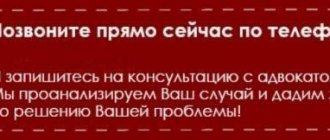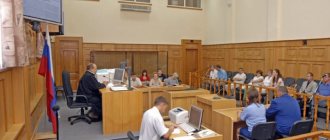Everything about criminal cases
Go to the text of the Code of Criminal Procedure
Url Additional information:
Participants in the court hearing in a special order
- Part 2 316 Code of Criminal Procedure
the defendant's participation is mandatory
- Part 2 316 Code of Criminal Procedure
participation of a defense attorney is mandatory
Questioning the defendant
(on procedural aspects)
- Part 4 316 Code of Criminal Procedure
it becomes clear whether he understands the accusation
- Part 4 316 Code of Criminal Procedure
Do you completely agree with the accusation?
- Part 4 316 Code of Criminal Procedure
does he support his request for a special procedure?
- Part 4 316 Code of Criminal Procedure
Is this request made voluntarily?
- Part 4 316 Code of Criminal Procedure
Was there a prior consultation with a defense lawyer?
- Part 4 316 Code of Criminal Procedure
does he understand the special consequences
Court hearing procedure
- part 3 316 of the Code of Criminal Procedure
the accusation is stated
- Part 4 316 Code of Criminal Procedure
the defendant is being questioned
- Part 4 316 Code of Criminal Procedure
the victim is being questioned
- Part 5 316 Code of Criminal Procedure
research and evaluation of evidence is not carried out
- Part 5 316 Code of Criminal Procedure
only characterizing data are examined
- Part 7 316 Code of Criminal Procedure
validity and evidence are still checked
Transition to general order
- Part 6 316 Code of Criminal Procedure
transition from a special order of consideration to a general order
- Part 6 316 Code of Criminal Procedure
if the defendant objects
- Part 6 316 Code of Criminal Procedure
if the prosecutor objects
- Part 6 316 Code of Criminal Procedure
if the victim objects
- Part 6 316 Code of Criminal Procedure
transition to a general procedure at the initiative of the court
Special punishment
- Part 7 316 Code of Criminal Procedure
punishment not exceeding 2/3 of the maximum term
Special sentence
- Part 8 316 Code of Criminal Procedure
provides a description of the criminal act
- Part 8 316 Code of Criminal Procedure
sets out the court's conclusions on compliance with the conditions of the special order
- Part 8 316 Code of Criminal Procedure
analysis and evaluation of evidence is not performed
— Part 9 316 Code of Criminal Procedure
the appeal procedure is explained
Termination of criminal case
— Part 9.1 316 Code of Criminal Procedure
the court may dismiss a case being considered under a special procedure
Procedural costs
— Part 10 316 Code of Criminal Procedure
procedural costs are not collected in a special manner
FEATURES of the trial in a special order
Features of judicial
process in a special order (
316 Code of Criminal Procedure
)
PUNISHMENT under special order
Features of punishment
under a special procedure: modifier
part 5 62 of the Criminal Code
and others
Article 316 of the Code of Criminal Procedure. The procedure for holding a court hearing and passing a verdict
1) A court hearing at the request of the defendant to pronounce a sentence without a trial in connection with agreement with the charge is held in the manner established by Chapters
35
-
39 of the Criminal Procedure Code, taking into account the requirements of this article.
Url Additional information:
-
P . 11
of Plenum No. 60 presence is required: defendant, defense lawyer, prosecutor
2) The court hearing is held with the mandatory participation of:
- the defendant,
- and his defender.
3) Consideration of the defendant’s request for a verdict without a trial begins with:
Url Additional information:
— P.
Plenum No. 51 sets out only the description of the crime and the accusation
- presentation by the state prosecutor of the charges brought against the defendant,
- and in criminal cases
of private prosecution - from the presentation of the accusation by a private prosecutor.
4) The judge questions the defendant:
- Does he understand the accusation?
Url Additional information:
— clause 5
Plenum No. 60 agreement with the prosecution under a special procedure
Guilty plea
Guilty plea
for a special order, the maximum quantity is required
- does he agree with the accusation,
- and whether he supports his request for a verdict without a trial,
- whether this application was made voluntarily,
- and after consultation with a lawyer,
Url Additional information:
— 317 Code of Criminal Procedure
it will not be possible to appeal the factual circumstances
— whether he understands the consequences of passing a sentence without a trial.
Url Additional information:
- paragraph 33
Plenum No. 17, the victim has the right to prohibit a special procedure
When the victim participates in the court hearing, the judge:
- explains to him the procedure and consequences of passing a sentence without a trial,
Url Additional information:
Consent of the victim
Consent of the victim
and the prosecutor, an ironclad condition for a special order
- and finds out his attitude to the defendant’s petition.
Url Additional information:
- part 1 240 of the Code of Criminal Procedure
the duty of research does not apply to the Head of the Code of Criminal Procedure
Proof
Features of proof
, the ability to study characterizing data
5) The judge does not conduct a general
examination
and
assessment of evidence collected in a criminal case.
Url Additional information:
— clause 10
Plenum No. 60 additional documents and questioning of witnesses
In this case, the following can be investigated:
Url Additional information:
— clause 1
Plenum No. 58 what is included in the characterizing data
-
circumstances characterizing the personality of the defendant;
Url Additional information:
— 61 CC
extenuating circumstances
- circumstances
mitigating punishment;
Url Additional information:
— 63 CC
aggravating circumstances
-
aggravating circumstances.
6) The judge makes a decision to terminate the special procedure for the trial and order the consideration of the criminal case in the general procedure if there is an objection:
Url Additional information:
Transition from a special order to a general one
Transition from special
order on the initiative of the defendant (
Part 6 316 of the Code of Criminal Procedure
)
- the defendant,
Url Additional information:
- clause 3, part 2 of 314 Code of Criminal Procedure
it is checked whether the accuser has any objections
— public or
private prosecutor,
Url Additional information:
- clause 3, part 2 of 314 Code of Criminal Procedure
it is checked whether the victim objects
— clause 11
Plenum No. 60, if the victim does not appear, his position is clarified
- paragraph 33
Plenum No. 17, the victim has the right to prohibit a special procedure
Victim's objection
Victim's objection
against special order, illustration
Transition from a special order to a general one
Transition from special
order on the initiative of the victim (
Part 6 316 of the Code of Criminal Procedure
)
- the victim,
Url Additional information:
Transition from a special order to a general one
Transition from special
order at the initiative of the court (
Part 6 316 of the Code of Criminal Procedure
)
- or on your own initiative.
7) If the judge concludes that the charge to which the defendant agreed:
Url Additional information:
Checking the validity of the accusation
- Part 7 316 Code of Criminal Procedure
validity and evidence are still checked
- paragraph 15
Plenum No. 60, when appealing, the validity of the accusation is checked
— paragraph 17
Plenum No. 55 in case of doubts about the validity, general procedure
- P.10.6
Plenum No. 25 on cases under Article
264.1 of the Criminal Code,
evidence is checked
Validity of the accusation
Validity check
charges are still being made (
Part 7 316 of the Code of Criminal Procedure
)
- justified, confirmed by evidence collected in the criminal case, then he makes
a guilty verdict;
Url Additional information:
— clause 14
Plenum No. 60 features of sentencing under a special procedure
- paragraph 39
Plenum No. 58 if at the same time there are two types of advantages of norm 62 of the Criminal Code
and imposes on the defendant a punishment that cannot exceed 2/3 of the maximum term or amount of the most severe type of punishment provided for the crime committed.
Url Additional information:
— P.12.1
Plenum No. 60 what is required to be indicated in the verdict under a special procedure
- paragraph 25
Plenum No. 55 reasoning part of the sentence in a special order
The descriptive and motivational part of the conviction must contain:
Url Additional information:
- Part 1 307 Code of Criminal Procedure
description of the criminal act in the sentence
—
description of the criminal act, the charge of which the defendant agreed to,
Url Additional information:
— clause 2
Plenum No. 60 prerequisites for a special order
— as well as the court’s conclusions on compliance with the terms of the sentence without a trial.
The analysis of evidence and its assessment by the judge is not reflected in the verdict.
Url Additional information:
Appeal
Scope of Appeal
special sentence
9) After pronouncing the verdict, the judge explains to the parties the right and procedure for appealing it, provided for in
Chapter 45.1 of the Criminal Procedure Code .
9.1) The judge may order the termination of a criminal case if there are grounds provided for in Articles
25.1 of the Code of Criminal Procedure, 28.1 of the Code of Criminal Procedure and 239 of the Code of Criminal Procedure.
Url Additional information:
- P.5
Plenum No. 42, a special procedure exempts from costs
10) Procedural costs provided for in Article 131 of the Code of Criminal Procedure are not subject to recovery from the defendant.
Return to the text of the Code of Criminal Procedure
Seek advice
Special procedure for considering a criminal case in court
So what is the special procedure for considering a case in court and how does it differ from the usual (general) procedure? The special procedure for trial is regulated by Chapter 40 of the Code of Criminal Procedure of the Russian Federation. This procedure means making a court decision (sentencing) without holding a trial, i.e. without examining the evidence presented by the prosecution and defense parties. Under this procedure, only materials characterizing the personality of the defendant, mitigating and aggravating circumstances are subject to consideration. According to Art. 315 of the Code of Criminal Procedure of the Russian Federation, the accused may submit a petition for a verdict without a preliminary trial after the completion of the preliminary investigation, when familiarizing himself with the materials of the criminal case, or at a preliminary hearing. The grounds for applying a special procedure for judicial proceedings are specified in Art. 314 Code of Criminal Procedure of the Russian Federation. They are: full recognition by the accused of his guilt in the charged crime, the consent of the accused with the charge brought, the presence of a petition from the accused for a verdict without a trial, the consent of the public prosecutor (prosecutor) and the victim with this petition and that the sanction of the article under which he is accused , did not exceed 10 years. However, even if all of the above conditions are present, the final decision to pronounce a sentence without a trial is made by the court, which may not satisfy the request of the accused (defendant) and consider the case in the general manner, i.e. with an examination of all evidence presented by the parties. Although in practice the courts willingly grant such requests, because with a special procedure for considering a criminal case, the time for considering the case is significantly reduced and there is no need to examine evidence or interrogate all participants in the trial. When considering a petition for the application of a special procedure for judicial proceedings, the court is obliged to find out whether there are conditions that prevent the application of a special procedure. In this case, the court must make sure that: 1. the accused (defendant) is aware of the nature and consequences of the stated petition, 2. the petition was submitted voluntarily, without any pressure and after consultation with the defense lawyer. If these conditions are not met, as well as if there are other obstacles, the court conducts a trial in accordance with the general procedure. Other obstacles include cases when the accusation brought is not confirmed by the case materials or the actions of the defendant are clearly given the wrong classification, or the classification of the crime raises doubts about its correctness and without a trial, without clarifying all the circumstances of the case, it is impossible to render a legal, reasonable and fair verdict. Therefore, if during the consideration of a criminal case in a special procedure, the court discovers obstacles to the adoption of such a verdict, it makes a decision to terminate the special procedure of the trial and appoints a consideration of the criminal case in a general manner. What are the features of passing a sentence without trial? What are its advantages in contrast to the general procedure for judicial consideration of a criminal case? Such a simplified procedure for considering a criminal case is in itself a mitigating circumstance, because it is carried out when the defendant fully admits his guilt and agrees with the charges, which indicates that the defendant repents of committing the crime. At the same time, according to Part 7 of Art. 316 of the Code of Criminal Procedure of the Russian Federation, the court cannot impose on the defendant a punishment exceeding 2/3 of the maximum term or the amount of the most severe type of punishment provided for the crime committed. In addition, as judicial practice shows, when considering a criminal case, courts in a special manner impose a more lenient punishment and more often apply Art. 64 (imposition of punishment below the lower limit of the sanction of the article of the Criminal Code of the Russian Federation) and Art. 73 of the Criminal Code of the Russian Federation (imposition of a suspended sentence). There is a small “minus” when passing a sentence without a trial (special procedure). This is the impossibility of appealing against such a verdict on appeal on the basis of a discrepancy between the court's conclusions in the verdict and the materials of the case, in other words, that the court's conclusions are not supported by evidence. However, for other reasons specified in Art. 380 of the Code of Criminal Procedure of the Russian Federation, as well as in cases of significant violations of the Code of Criminal Procedure of the Russian Federation, incorrect application of the criminal law, injustice of the sentence, such a sentence can be appealed.
Article 316. Procedure for holding a court hearing and passing a verdict
Article 316. Procedure for holding a court hearing and passing a verdict
[Code of Criminal Procedure] [Part Three] [Section X] [Chapter 40]
. A court hearing at the request of the defendant to pronounce a sentence without a trial in connection with agreement with the charge brought is held in the manner established by Chapters 35, 36, 38 and 39 of this Code, taking into account the requirements of this article.
. The court hearing is held with the mandatory participation of the defendant and his defense attorney.
. Consideration of the defendant’s request for a verdict without a trial begins with the state prosecutor’s presentation of the charges brought against the defendant, and in criminal cases of private prosecution, with the presentation of the charges by the private prosecutor.
. The judge asks the defendant whether he understands the charges, whether he agrees with the charges and whether he supports his petition for sentencing without a trial, whether this petition was submitted voluntarily and after consultation with the defense lawyer, whether he understands the consequences of sentencing without a trial. When the victim participates in the court hearing, the judge explains to him the procedure and consequences of passing a sentence without a trial and ascertains his attitude to the defendant’s petition.
. The judge does not conduct a general examination and assessment of evidence collected in a criminal case. In this case, circumstances characterizing the personality of the defendant, and circumstances mitigating and aggravating the punishment can be examined.
. If the defendant, public or private prosecutor, or victim objects to the sentencing without a trial or on his own initiative, the judge makes a decision to terminate the special procedure of the trial and order the consideration of the criminal case in the general manner.
. If the judge comes to the conclusion that the accusation agreed with by the defendant is justified and supported by the evidence collected in the criminal case, then he will pronounce a guilty verdict and impose a sentence on the defendant, which cannot exceed two-thirds of the maximum term or the amount of the most severe type of punishment provided for. for the crime committed.
. The descriptive and motivational part of the conviction must contain a description of the criminal act, the charge of which the defendant agreed to, as well as the court’s conclusions about compliance with the conditions of the sentence without a trial. The analysis of the evidence and its assessment by the judge is not reflected in the verdict.
. After pronouncing the verdict, the judge explains to the parties the right and procedure for appealing it, provided for in Chapter 45.1 of this Code.
. Procedural costs provided for in Article 131 of this Code are not subject to recovery from the defendant.
New in the Criminal Procedure Code. Inquiry in abbreviated form
The State Duma adopted in the third reading the law “On Amendments to Articles 62 and 303 of the Criminal Code of the Russian Federation and the Criminal Procedure Code of the Russian Federation,” introducing changes to the current procedure for investigating criminal cases. Thus, this law introduces a new type of preliminary investigation - inquiry in an abbreviated form . The Criminal Procedure Code will be supplemented with Chapter 32.1 “Inquiry in an abbreviated form.” In accordance with this chapter, an inquiry in an abbreviated form is carried out in the manner established by Chapter 32 of this Code, with the exceptions provided for in Chapter 32.1 of the Criminal Procedure Code of the Russian Federation. So, how does an inquiry in an abbreviated form differ from an inquiry in a general manner: Firstly, in terms of the period, the period of an inquiry in an abbreviated form should not exceed 15 days from the date of initiation of a criminal case, in exceptional cases it can be extended to 20 days. At present, the inquiry is generally carried out within thirty days. Secondly, an inquiry in an abbreviated form is carried out on the basis of a petition from the suspect to conduct an inquiry in a criminal case in an abbreviated form.
Thirdly, in order to use an inquiry in an abbreviated form, several conditions must be simultaneously present, namely: a criminal case must be initiated against a specific person on the grounds of one or more crimes specified in paragraph 1 of part 3 of Art. 150 of the Criminal Procedure Code of the Russian Federation, the suspect must admit his guilt, the nature and extent of the harm caused, the legal assessment of the act given in the decision to initiate a criminal case, · there must be no circumstances excluding the conduct of an inquiry in an abbreviated form, provided for in Article 226.2 of the Criminal Procedure Code RF.
Fourthly, during an inquiry in an abbreviated form, the limits of evidence are also limited; evidence will be collected to the extent necessary to establish the event of a crime, the circumstances of involvement in the commission of a crime. Consequently, the inquiry authorities will be able not to check evidence that is not disputed by the suspect, his defense and the victims.
Fifthly, during an inquiry in an abbreviated form, the investigator, recognizing that the necessary investigative actions have been carried out, draws up an indictment. And during the inquiry, an indictment is drawn up in accordance with the general procedure. Circumstances excluding the conduct of an inquiry in an abbreviated form:
1) the suspect is a minor; 2) there are grounds for proceedings to apply compulsory measures of a medical nature in the manner established by Chapter 51 of the Criminal Procedure Code of the Russian Federation;
3) the suspect belongs to the category of persons in respect of whom a special procedure for criminal proceedings is applied, established by Chapter 52 of the Criminal Procedure Code of the Russian Federation;
4) a person is suspected of committing two or more crimes, if at least one of them does not relate to the crimes specified in paragraph 1 of Part 3 of Art. 150 of the Criminal Procedure Code of the Russian Federation;
5) the suspect does not speak the language in which criminal proceedings are conducted;
6) the victim objects to the conduct of the inquiry in an abbreviated form.
In the event that the circumstances provided for in Part 1 of Art. 226.2 of the Criminal Procedure Code become known after a decision is made to conduct an inquiry in an abbreviated form, but before sending the criminal case to the prosecutor for approval of the indictment, then the person in charge of the criminal case makes a decision to conduct an inquiry in the general manner.
In accordance with Art. 226.9 of the Criminal Procedure Code of the Russian Federation, a verdict in criminal cases, the investigation of which was carried out in an abbreviated form, is carried out in the manner established by Art. 316, 317 of this code, i.e. in a special manner, without a judicial investigation. The punishment imposed on the defendant cannot exceed 1/2 of the maximum term or the amount of the most severe type of punishment provided for the crime committed. In case of disagreement, the defendant has the right to file a motion to terminate the proceedings in an abbreviated form and to apply the general procedure. This can be done at any stage of the proceedings until the court retires to the deliberation room.
In this regard, in Part 5 of Art. 62 of the Criminal Code was also amended, namely, the words were added, “and in the case specified in Article 226.9 of the Criminal Procedure Code of the Russian Federation, one-half of the maximum term or amount of the most severe type of punishment provided for the crime committed.”
PS I understand that the legislator with this novelty is helping to ease the work of investigators, whose ranks are already thinning, I only hope that this does not lead to the rubber-stamping of criminal cases without examining many circumstances that are related to the criminal case and the classification of the crime.
Commentary on Article 316 of the Code of Criminal Procedure of the Russian Federation
1. The commented article establishes the procedure for passing a sentence when a defendant petitions for a court decision to be made in a special manner in connection with the person’s consent to the charge brought against him. The fact that Part 1 of the commented article contains a reference to Ch. 35, 36, 38 and 39 of the Code of Criminal Procedure of the Russian Federation, means that all procedural guarantees apply to the defendant, ensuring the imposition of a legal, reasonable and fair verdict. The features enshrined in this article are determined solely by the specifics of the procedure for examining the materials of a criminal case by the court.
2. Within the meaning of the legal provisions of Ch. 40 of the Code of Criminal Procedure of the Russian Federation, exceptions established in a special procedure for making a court decision allow the court not to conduct a general examination of the evidence collected in a criminal case. The rest of the court hearing must be conducted in compliance with the general requirements of the law.
3. An important guarantee of making a legal, informed and fair decision is the mandatory participation of the defendant and his defense attorney in the court hearing.
4. In the preparatory part of the court session, the participation, along with the defendant and his defense attorney, of a public or private prosecutor must be ensured. The court must find out from the defendant whether he understands the charge, whether he fully agrees with the charge and the civil claim, if any, and whether he supports his request for a verdict without a trial; whether this request was made voluntarily and after consultation with the defense lawyer; whether he understands the consequences of passing a sentence without a trial.
5. During the court hearing, the presentation of the charges occurs in the general manner established by Part 1 of Art. 273 Code of Criminal Procedure of the Russian Federation. After this, the judge once again asks the defendant whether he supports his petition, and whether the other conditions specified in Parts 1–2 of Art. 314 Code of Criminal Procedure of the Russian Federation.
6. The main feature of the court making a decision when the accused agrees with the charge brought against him is that the court does not directly examine the evidence, but examines and evaluates it based on the materials of the criminal case.
However, in cases where one of the interested parties receives a request to terminate the proceedings in a special manner, he has the right to make an appropriate decision, after which the criminal proceedings continue in the usual manner.
7. Keeping in mind that by virtue of Part 5 of Art. 316 of the Code of Criminal Procedure of the Russian Federation, the judge examines only the circumstances characterizing the personality of the defendant, and the circumstances mitigating and aggravating the punishment; the court does not have the right to deny the parties the opportunity to participate in the debate, and the defendant has the last word to speak out on these issues in the manner prescribed by Art. 292 and 293 of the Code of Criminal Procedure of the Russian Federation.
8. Since the procedure for studying the circumstances characterizing the personality of the defendant, and the circumstances mitigating and aggravating the punishment, Ch. 40 of the Code of Criminal Procedure of the Russian Federation is not limited; it can be carried out by all methods provided for by the criminal procedure law, including by examining additionally submitted materials, as well as interrogating witnesses on these circumstances.
9. When considering criminal cases in a special manner, issues related to confiscation are resolved in the verdict by the court on the basis of the materials of the criminal case, indicating the reasons for the decision made. If necessary, in order to clarify circumstances significant for resolving these issues, the court reads out the materials available in the case and additionally presented by the parties. The court gives the parties in the debate and the defendant the opportunity to speak out in the last word, including on the issue of possible confiscation of property.
10. The presence of a request from the accused to summon defense witnesses to the court hearing and to conduct confrontations, as well as his disagreement with the merits of the accusation are circumstances that prevent the consideration of a criminal case in a special manner, provided for in Chapter. 40 Code of Criminal Procedure of the Russian Federation.
11. When deciding on the termination of the special procedure for trial and the appointment of consideration of the criminal case in the general manner in accordance with Part 6 of Art. 316 of the Code of Criminal Procedure of the Russian Federation, it is necessary to comply with the established part 4 of Art. 231 of the Code requires notification of the parties about the place, date and time of the court hearing at least 5 days before its start.
12. The court has the right to pronounce a guilty verdict only if it comes to the conclusion that the accusation is justified and supported by specific evidence.
13. When a conviction is made in relation to the punishment established by the relevant article of the Special Part of the Criminal Code of the Russian Federation, an additional restriction is put forward. In any case, the penalty may not exceed two-thirds of the maximum term or the most severe penalty provided for the crimes committed. In addition, the convicted person is subject to other rules established by criminal law: exemption from criminal liability (Chapter 11 of the Criminal Code of the Russian Federation); exemption from punishment (Chapter 12 of the Criminal Code of the Russian Federation); application of amnesty and pardon (Chapter 13 of the Criminal Code of the Russian Federation). However, this requirement does not apply to additional punishments and alternative types of punishment specified in the sanctions of the articles of the Special Part of the Criminal Code of the Russian Federation.
14. Taking into account the peculiarities of legal proceedings carried out in accordance with the provisions of Chapter. 40 of the Code of Criminal Procedure of the Russian Federation, in the descriptive and motivational part of the sentence, rendered in a special manner with the consent of the accused with the charge brought, it is necessary to reflect that the court was satisfied that the conditions established by law were observed.
In particular, it must be indicated that the accusation is justified, supported by the evidence collected in the case, and the defendant understands the essence of the accusation brought against him and agrees with it in full; he filed a request for a special procedure in a timely manner, voluntarily and in the presence of a defense lawyer, and is aware of the nature and consequences of his request; The public or private prosecutor and the victim have no objections to considering the case in a special manner.
15. A conviction rendered as a result of a decision in a special manner contains a description of the criminal act contained in the indictment (indictment, indictment), with which the defendant agrees; the reasons for applying a special procedure for a court decision are given; the conclusion about the sentencing of the defendant is substantiated using the provisions of Art. 61 and 62 or 64 of the Criminal Code of the Russian Federation.
16. After the verdict is announced, the convicted person is explained the procedure for appealing it, established by Chapter. 451 Code of Criminal Procedure of the Russian Federation. It is also explained to the convicted person that the sentence can be appealed by him within the limits established by Art. 317 of the Code.
17. Chapter 40 of the Code of Criminal Procedure of the Russian Federation does not contain rules prohibiting the adoption of court decisions other than a guilty verdict in a criminal case considered in a special order, in particular: what the accused has done can be qualified, and the criminal case itself terminated (for example, in connection with expiration of the statute of limitations, changes in the criminal law, reconciliation with the victim, amnesty, refusal of the state prosecutor to charge, etc.), unless this requires an examination of the evidence collected in the case and the factual circumstances do not change. If a civil claim is brought in a criminal case considered in a special manner, then, if there are appropriate grounds, it may be left unsatisfied, the proceedings on it terminated, its satisfaction may be refused, or a decision may be made on the claim to transfer it for consideration in civil proceedings. legal proceedings, unless this entails a change in the factual circumstances of the case.
18. The fact that the legal costs provided for in Art. 131 of the Code of Criminal Procedure of the Russian Federation, which is not collected from the defendant, is an additional advantage of using a special procedure for the trial for the defense. At the same time, the prosecution does not have the right to persuade a person to agree with the charge brought against him, using this as an additional argument and making up for the lack of evidence confirming the guilt of the accused of the act accused of him.






